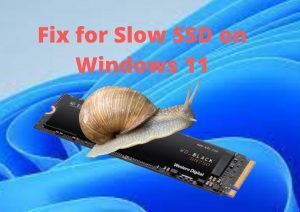Fix for Slow SSD on Windows 11
Microsoft started rolling out Windows 11 in October 2021, but only a meager 9% percent of Windows 10 users appeared to have updated to the latest operating system. It’s safe to say this reluctance results from the multiple reports of bugs Windows 11 users are experiencing.
Sometime in October. AMZ Ryzen devices that were hit by Windows 11 bugs. But this time around, users with devices running on a solid-state drive (SSD) bear the brunt.
If you’ve noticed a dramatic decrease in the write/read speed of your device since you updated to Windows 11, you’d be glad to know it’s virtually a universal problem, one which Microsoft itself has admitted and promised to address with an update.
Here, we highlight simple fixes you can employ to get your device running fast again.
Fixes for Slow SSD on Windows 11
Frankly speaking, the only fix available for slow SSD on Windows 11 is within the confines of an update. There is barely any fix or trick you can apply to speed up the performance pending when you get an update.
Thankfully, since November, Microsoft has pushed the update they promised would fix all SSD and performance issues on Windows 11. The update codenamed KB5007262 states that it “addresses an issue that affects the Windows performance on all disk types (NVMe, HDD, SSD) by initiating unnecessary processes every time a write/read operation occurs.”
Unfortunately, this update is currently available as a preview patch, which means it’s not pushed to Windows 11 devices automatically. You might have to check for the update manually or even go the length of downloading the update externally on Microsoft’s updates depository.
If you’ve genuinely experienced the frustrations that come with working on a slow PC, updating manually should only be a piece of cake.
How to Get KB5007262 patch for Slow SSD on Windows 11
Thankfully, the update process is relatively hassle-free:
- First, press Windows key + I to launch settings
- Navigate to and click Windows Update on the left pane
- Click on “Check for Updates”
- You’ll find the KB5007262 update there if it’s available, and the download should begin automatically.
Ensure to restart Windows once the update is completed. Alternatively, if you can’t find the update in settings, you can download it manually from Microsoft’s official update catalog.
- Open Chrome browser and paste the link.
- Once in the update catalog, click Download next to the update
- There are two architectures, which are X64 and Arm64. Ensure you select the right one for your device
- Once the download is completed, open the update file and follow the prompts
Again, ensure to restart Windows once the update is completed and leave enough battery juice on your device before attempting the update.
Final Notes
Downloading and installing the KB5007262 on your PC will automatically fix the slow SSD issues you’re experiencing; therefore, you shouldn’t trivialize the update as it’s the only permanent fix. Unfortunately, this update isn’t without its issues, which you will find here.
The known issues aren’t universal. Therefore, you might be lucky not to experience them. The issues aren’t a deal-breaker as there are workarounds for them.

